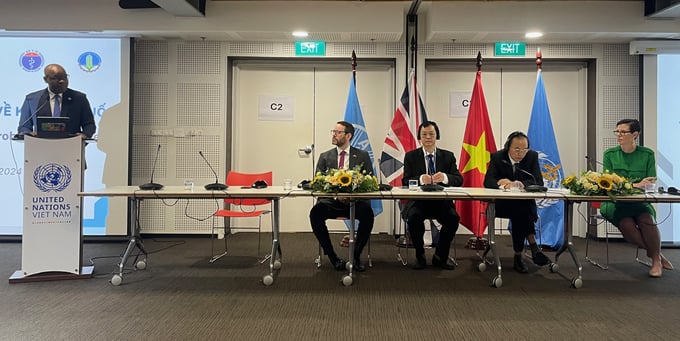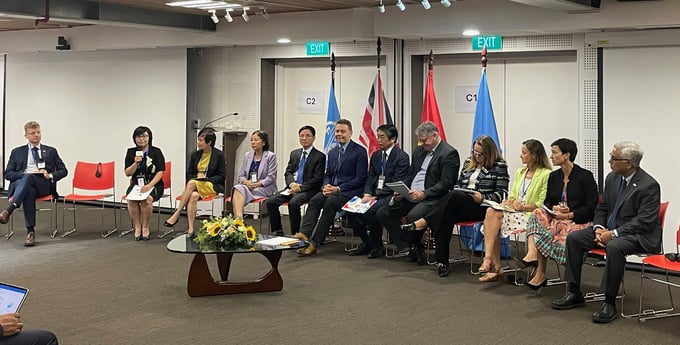November 25, 2025 | 10:07 GMT +7
November 25, 2025 | 10:07 GMT +7
Hotline: 0913.378.918
November 25, 2025 | 10:07 GMT +7
Hotline: 0913.378.918

Antimicrobial resistance poses a significant threat to both public health and the economy, requiring collaboration from various agents and sectors in Vietnam. Photo: FAO.
The high-level roundtable conference on combating antimicrobial resistance, jointly organized by the British Embassy in Hanoi, FAO, and WHO, took place in Hanoi on August 29. Participants of the event discussed the development and severity of antimicrobial resistance.
Antimicrobial resistance occurs when bacteria, viruses, fungi, and parasites exhibit an increasingly strong resistance to medications, making infections harder to treat. Antimicrobial resistance spreads rapidly through various environments, including healthcare facilities, animals, food, soil, and water. This condition increases the risk of disease transmission, exacerbates illnesses, and increases disabilities and deaths. As a result, antimicrobial resistance is one of the greatest threats to public health and global development.
The ongoing fight against antimicrobial resistance requires cooperation between the health, animal, and environmental sectors, which involves the participation of policymakers, healthcare facilities, private entities, agricultural workers, and local communities.
Deputy Minister of Agriculture and Rural Development Phung Duc Tien emphasized the necessity of supporting Vietnam in implementing the National Action Plan on Combating Antimicrobial Resistance in Agriculture. He also urged farmers to administer the appropriate medication at the correct dosage only when necessary.
“We have been implementing the action plan to combat antimicrobial resistance in agriculture since 2017. Subsequently, we have issued and revised several regulations to reduce the use of antibiotics in agriculture. It is important for all levels of the government, from central to local, and the community to support the implementation of these regulations and the National Action Plan. Every Vietnamese citizen, whether involved in agriculture or not, can contribute to this cause by administering the appropriate medication at the correct dosage as prescribed,” stated Deputy Minister Phung Duc Tien.
Deputy Minister Tien noted that although the agricultural sector has achieved multiple significant milestones since the establishment of the National Action Plan in 2013, challenges remain in preventing and controlling the increasing trend of antimicrobial resistance in the healthcare sector.
Deputy Minister of Health Nguyen Tri Thuc called on Vietnamese citizens to join hands in preventing the rapid development of antimicrobial resistance. According to Deputy Minister Thuc, despite the considerable progress in Vietnam's campaign against antimicrobial resistance, it faces several challenges. Consequently, close coordination between the health sector and the agricultural, animal, plant, and environmental sectors is required to address this issue.
Notably, the Government has issued a National Action Plan for the health sector for the years between 2024 and 2025 to accelerate the implementation of the antimicrobial resistance prevention strategy. Deputy Minister Thuc called for collaborative efforts between all stakeholders, from healthcare workers to the public, to collectively achieve the goal of preventing antimicrobial resistance.

Representatives from international organization commended Vietnam's efforts in combating antimicrobial resistance. Photo: FAO.
The WHO Representative in Vietnam commended Vietnam's National Strategy on Combating Antimicrobial Resistance. He emphasized that antimicrobial resistance not only affects human health but also has severe economic and social consequences. He further stressed the necessity and urgency of immediate actions to combat antimicrobial resistance.
Accordingly, these actions include improving access to clean water, sanitation, and hygiene (WASH) for humans and animals and enhancing disease prevention and control in households, healthcare facilities, farms, and food industry establishments.
Improving access to vaccines, diagnostics, and prescriptions, minimizing pollution, maintaining effective waste management and sanitation, and raising community awareness and knowledge regarding the use and misuse of antibiotics are other crucial factors under the campaign.
Dr. Nono Womdim, FAO Representative in Vietnam, highlighted the significance of the upcoming high-level conference on antimicrobial resistance at the United Nations General Assembly on September 26.
This conference aims to propose sustainable solutions in combating antimicrobial resistance. Preventing and responding to antimicrobial resistance will greatly benefit food production, animal health, the environment, and the healthcare sector.
FAO is closely coordinating with other international organizations to develop a joint political declaration as a means to strengthen global efforts against antimicrobial resistance. The ultimate goal of the declaration is to preserve the effectiveness of antibiotics and promote rational and sustainable use, thereby contributing to the achievement of the Sustainable Development Goals (SDGs).
British Ambassador Iain Frew also praised Vietnam's efforts in combating antimicrobial resistance. He emphasized Vietnam's pioneering role in the region and pledged continued support from the UK for Vietnam's National Action Plan on Combating Antimicrobial Resistance launched in 2013.
This plan, with support from international partners such as the UK, has provided a foundation for critical responses to antimicrobial resistance through the One Health multi-sectoral approach. The second phase of the UK's Fleming Fund in Vietnam, focusing on environmental and industrial sectors, promises to yield further positive results.
Ambassador Iain Frew also expressed hope that the upcoming United Nations conference on antimicrobial resistance will provide an opportunity for countries to make stronger and more drastic commitments. WHO, FAO, the British Embassy, and other partners pledged to continue their support for Vietnam in combating antimicrobial resistance to protect public health and general development.
Translated by Nguyen Hai Long

(VAN) Heavy rains make aquatic species more vulnerable to disease. Proactive water management and high-tech systems help farmers prevent outbreaks and protect yields.

(VAN) Greenhouses are shifting production mindsets in Binh Lu commune, enabling farmers to ‘weather the sun and rain’ and secure stable vegetable harvests throughout the year.

(VAN) Green transition is crucial for the Mekong Delta amid climate change and stricter standards, offering a path toward sustainability.

(VAN) Dong Thap promotes agricultural restructuring, forms large specialized farming zones, raises the value of agricultural products and develops toward ecological and high-tech directions.
/2025/11/22/4018-4-213342_747.jpg)
(VAN) The Mekong Delta Agricultural Experts Club has attracted 143 experts and researchers to participate in providing consultancy and contributing initiatives to the development of one million hectares of high-quality rice.

(VAN) Ca Mau’s development of OCOP products opens a path to increasing cooperatives value, helping boost income, expand markets, and affirm collective economy's role.

(VAN) Turning seemingly ordinary coconut shells into unique jewelry and artwork, Nguyen Bang Nhi spreads the value of local culture through her brand, Cocohand.